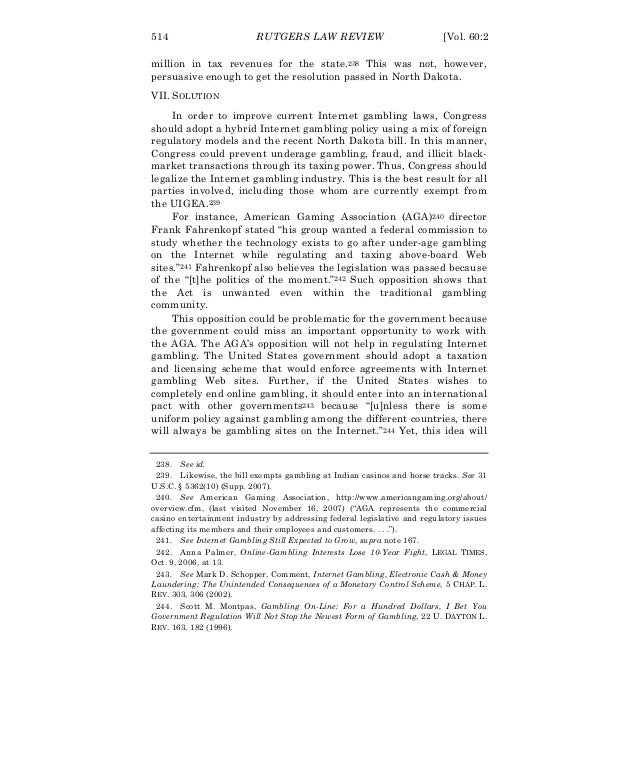Uigea
The UIGEA is often referred to as the United States anti-online casino bill, but is actually an acronym for the Unlawful Internet Gambling Enforcement Act (of 2006). This piece of legislation was simply tacked on to a much larger bill that mainly dealt with security at the country’s ports. The legislation has a somewhat confusing history, and we will do our best to extrapolate on it here.
Congressional findings and purpose § 5362. Definitions § 5363. Prohibition on acceptance of any financial instrument for unlawful Internet gambling. The UIGEA (Unlawful Internet Gambling Enforcement Act) was passed in November of 2006, as part of the SAFE Port Act, with most voters not even being aware of its existence In 2002, it was determined that the Federal Wire Act doesn’t restrict online gambling.
UIGEA History
Uigea Act
After several unsuccessful attempts to pass anti gambling legislation, in 2006, members of Congress came up with another idea, to sneak some anti gambling legislation into an existing bill that already had been passed by Congress.
The SAFE Port Act, a bill dealing with the protection of America’s ports, was passed by the House of Representatives on May 4, 2006, and by the Senate on September 14, 2006. It did not include any references to gambling at this point though.
Then, the anti gambling folks went to work, and the UIGEA provisions were added to the bill, and over the next few days it was resubmitted to both the House and the Senate, where the usual reading of the additions to the bill were waived.
It received approval in spite of hardly anyone knowing much about this new addition, and then the revised bill was signed into law by President George W. Bush on October 13, 2006.
As testimony to this being rammed through without a proper review by legislators, the UIGEA provisions were taken directly from a previous bill that had failed to be passed by Congress, the Internet Gambling Prohibition and Enforcement Act. Instead of failing, the new SAFE Port Act with the UIGEA add on was passed by the House by a vote of 409-2 and received unanimous approval in the Senate.
So they had found a way to get something like this passed, after several years of trying without any success. While many feel that the UIGEA should at least be challenged, it remains on the books today, in full force.
What Does The UIGEA Do Exactly?
Sample Unlawful Internet Gambling Policy
The goal of the U.S. federal government had up until this point been an effort based upon propaganda, and this strategy continued on with the UIGEA. It didn’t help that the public hasn’t had a very good understanding of gambling law, but federal authorities have always been more than happy to enhance and perpetuate this misinformation and misunderstanding.
So after the UIGEA was passed, many people thought online gambling was now illegal in the United States, by way of federal law, if it wasn’t already, and they were already telling us it was so it surely is illegal now. Seeing most offshore online gambling sites exit the U.S. market just fueled the fire with this perception.
Since the goal of the UIGEA was to drive these foreign operators out of the market, the legislation was a big success indeed, and a lot of this was driven by a lot of these offshore sites just not wanting to bother with the U.S. market anymore, they had had enough in other words.
The UIGEA does not in any way make online gambling illegal though, either on the part of players or on the part of operators. It actually really didn’t change anything from a practical perspective, but it sure blew a lot of smoke and some of this got in the eyes of some people.
So what does the UIGEA do anyway? Well it makes it illegal for gambling operators to accept illegal gambling related financial transactions. However, given that the gambling in question is already illegal, whatever law that made it illegal in the first place could already be used.
Uigea Risk Assessment Sample
For instance, if someone in the United States is found to be operating an illegal sports betting operation, they could be convicted under the Wire Act, the law that made it illegal, and merely accepting bets would be sufficient, as well as required, for a conviction, so the UIGEA would add nothing really, even though there would be financial transactions involved as well and they could be charged under the UIGEA as well, but this is not really meaningful.
The Effects of the UIGEA
So this law pertains only to those in the business of gambling, online gambling operators, not to players or financial institutions, as many people still believe. The gambling in question must already be illegal, in which case, once again, if they are to be charged and convicted, in all cases they could be charged and convicted with or without the UIGEA.
Of course, the scope of the law only applies to those under U.S. law, which rules out any and all foreign operators, they are not subject to the laws of the United States, but rather, the laws of the jurisdiction in which they are located. This is also not well understood by the public.
The idea behind the UIGEA was not really a legal one, it was to use this to bolster the propaganda effort that the U.S. government was waging upon both the public and offshore businesses involved in the online gambling trade.
The government already had tools to charge companies processing financial transactions related to illegal gambling, as it did with the two founders of Neteller, who were both charged with money laundering. In order to make these charges stick you have to prove, among other things, that the proceeds were actually from illegal activity, but the government doesn’t worry about these things because the threat of this is enough.

The amount of talk around about the UIGEA since has been phenomenal, and you would think from reading a lot of it that the UIGEA produced some groundbreaking changes, when in fact it added nothing really to the online gambling landscape, save for it serving to confuse a lot of people.
In spite of what a lot of people think, there really isn’t even a need to repeal this law, it’s a meaningless law really with no teeth at all of its own, and at best could be just added on to any genuinely prosecutable gambling charges that the government may wish to wield on online gambling operators.

These operators though generally aren’t really under their thumb though in any sense, and unless they are foolish enough to visit the U.S. while under indictment, like those two fellows from Neteller did, or are an American resident who is looking to run a domestic sports book, the UIGEA is nothing to bother about at all, and these people could be charged with or without the UIGEA in effect.
The UIGEA has served to scare and intimidate though, and quite a few offshore gambling sites washed their hands with the U.S. after this, and several major payment processors have also exited the market, and a lot of players have stopped playing.
Fortunately though, there are enough operators and businesses, as well as a huge number of players, who understand things well enough not to be unduly intimidated, and the online gambling industry in the United States continues to thrive.
UIGEA FAQs
Does the UIGEA mean I cannot gamble online?
No, there are hundreds of online casinos able to offer real money games to people from the United States. Despite UIGEA’s existence, it is still completely within the realm of the law if you gamble online at one of the many sites that still accept US deposits.
Will my bank account be frozen if I use it to deposit at an online casino?
No. The simple fact of the matter is that no one has ever had their bank account frozen because they decided to gamble online in the United States. You should have no concerns about the safety of your banking assets when you choose to gamble online.
Will UIGEA ever be repealed?
There have quite honestly not been too many efforts made to repeal this bill, and there are not many that seem to be coming in the near future. This will allow the US to still be considered a nation that is not friendly to fans of online casinos.

Does UIGEA still make intrastate gambling illegal?

No. States like New Jersey and Nevada, which have their own legal, regulated intrastate online casino networks, do not have to worry about facing prosecution under UIGEA. This is why so many states are pushing to legalize similar intrastate networks.
Also read:
When talking about the history of online poker, you only have to look at the past decade and certain key events which took place and had a considerable impact on today’s online poker world. One such event was the UIGEA, which we’ll go on to discuss in more detail below.
Since online poker’s inception in the late 90′s, the online poker industry has experienced steady growth but has also had its fair share of setbacks. Following Chris Moneymaker’s win in 2003, online poker experienced exponential growth, and the game, both online and live became more and more popular. The industry continued to grow for a few years when the UIGEA, also referred to as the Unlawful Internet Gambling Enforcement Act was established.
More specifically, the UIGEA is Title VIII of the Safe Port Act of 2006, which was passed into law when it was added last minute by President George Bush to the Safe Port Act. The bill’s biggest supporters included UIGEA included Jim Leach, Robert Goodlatte, Bill Frist and Jon Kyl. All of them were republicans. There were a lot of people who were outraged that these US politicians were allowed to sneak the UIGEA through on the back of an unrelated bill in such an underhanded manner. Independent polls at the time showed that the majority of Americans believed that they should have the right to decide whether they gamble online or not.
This gambling bill created a big grey area for online poker players in the United States, brought about because the bill was so vague and no company or person could figure out exactly what type of gambling was considered unlawful. At the time of the UIGEA’s passing many understood the law prohibited players from participating in online gambling, which online poker was considered at this time, however, there were strong proponents in the world of online gambling that believed the UIGEA didn’t make playing online poker illegal. It made processing transactions from financial institutions and banks between online gambling websites illegal.
The purpose of the UIGEA was to protect players and to provide online gambling operators with a set of ethical banking processes to adhere to. It was not designed to target players, but rather the processes involved in funding player’s online gambling accounts. However, since the 2006 bill blocked financial institutions from processing transactions, players may find it more difficult making deposits and withdrawals from online poker sites.
The passing of the UIGEA lead to several of the biggest payment processors including Neteller, FirePay, Citadel Commerce and others to cease operating in the U.S. market, forcing online poker players in the United States to look at other alternative funding options if they wanted to continue playing poker online.

It also resulted in the shutdown of many online gambling and online poker sites, including Party Poker and Pacific Poker, both of which were two of the biggest sites accepting players from the United States. They completely withdrew from the USA market to focus on other international markets and this literally happened overnight. Both operators have only just recently returned to the U.S. following the regulation of online gambling laws in a few states.
Some online poker sites made the decision to stay in the US, including PokerStars and Full Tilt Poker. Both of these sites really benefited from the passing of the UIGEA since they were the best sites still available to US players so many flocked to these rooms. But they no longer continue to service US customers, following the Black Friday indictments, making online poker players in the United States have to look for other alternatives once again.
At the time of this writing article, Nevada, New Jersey and Delaware have all passed laws that permit online gambling for their residents. However, apart from those states, there are currently not any other federal or state laws which legalize online gambling, or prohibit offshore operators for US players. Other U.S. states would no doubt be paying close attention to what was happening in regulated markets, and it would be expected that other states will follow suit, either doing it alone and setting up their own frameworks or combining player pools and resources is also a real possibility.
For players who reside in states where online poker is not yet subject to regulation and licensing requirements, it’s important to realize that gambling laws and regulations never have specifically targeted players. Even post-UIGEA, players have had to deal with the fiasco of Black Friday, when three of the largest online poker sites accepting players from the United States were shut down. During the investigations, no US residents who played poker online for money have been prosecuted or arrested.
Overall, even with the setbacks, there are still plenty of opportunities for playing poker online for those who reside in the US.